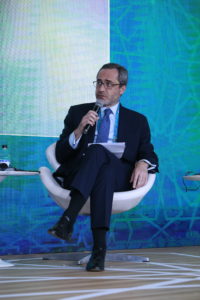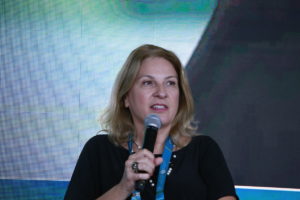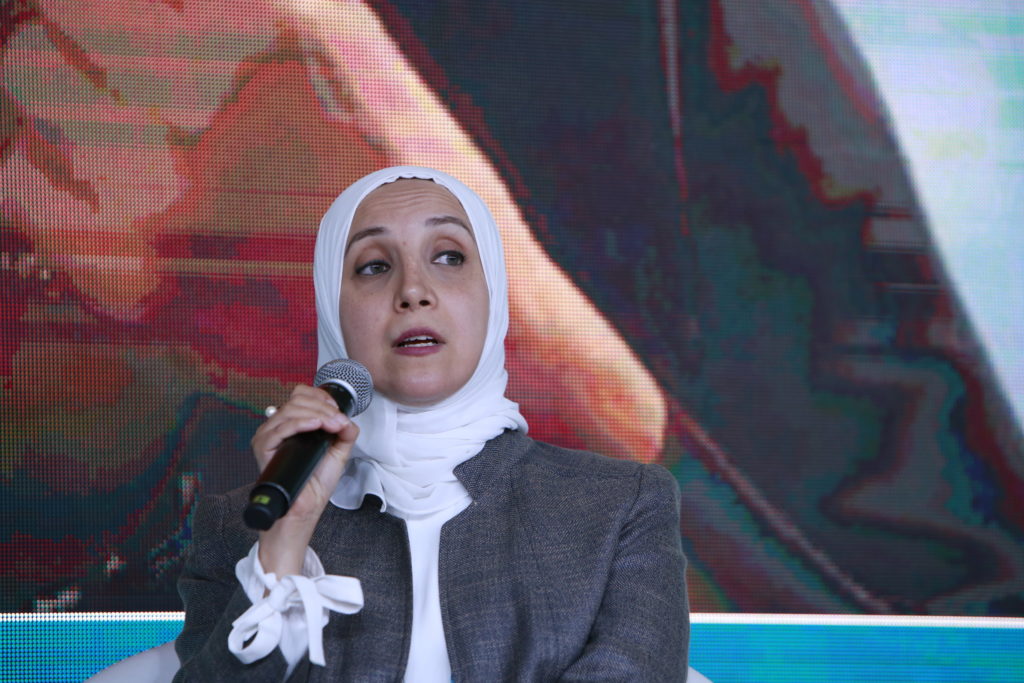São Paulo – “We must remember that the Arab world goes beyond its borders,” said the secretary-general of the Federation of Egyptian Chambers and moderator of the panel “Economic Integration for Competitiveness and Investment” of the Economic Forum Brazil & Arab Countries. “We have free trade agreements and access to over 3 billion consumers in our region. Likewise, Brazil can also be a gateway for us into the markets of the Americas. It’s a win-win situation.”

This was reinforced by the dean of the College of International Transport and Logistics of the Arab Academy for Science, Technology & Maritime Transport (AASTMT), Sara Hassan Kamal Elgazzar (pictured above). She said that the two regions posted a record-high increase of USD 7 billion dollars in 2021, thus reaching USD 24 billion. “We can say that there have already been notable improvements,” the dean said. “Now it is time to focus on more strategic alliances than direct trade.”
For this to happen, four pillars must be considered: technology, logistics, bilateral agreement, and halal certification. Focused on technology, the AASTMT’s dean mentions the initiative of the Arab Brazilian Chamber of Commerce (ABCC) to use blockchain technology for sharing information and documents, as well as an innovation lab to support startup initiatives.
On logistics, Elgazzar mentions the creation of hubs in the Arab countries such as the Suez Canal Economic Zone. “We can have high value-added activities, a trade platform for manufactured and pharmaceutical products, as well as food logistics centers in the United Arab Emirates,” the dean said. “We could establish databanks with different services and equipment available, as well as different commodity centers between the Arab countries and Brazil.”

The third aspect highlighted by Elgazzar is related to the bilateral trade and signing more partnerships like the Mercosur-Brazil free trade agreement. Last she stressed the need for training Brazilian companies to know the procedures to get halal certification, particularly for pharmaceutical, cosmetics and food items. “With these four pillars, in addition to all initiatives carried out by the ABCC, we can shift from more traditional agreements to a more strategic alliance,” she said.
Such alliances could go through the economic diplomacy and the Department of Trade and Investment Promotion at the Ministry of Foreign Affairs. According to ambassador Alex Giacomelli da Silva, who is the director of this department, the institution aims at joining efforts with other governmental and private agencies to promote trade and investment in both ways. “The ABCC is one of the most active ones in Brazil,” he said. “We have much in common.
According to the director, for fulfilling this mission in a more productive manner, the Ministry must be updated with the most advanced ways of promoting trade and investment. “We have to work as much as possible with companies, governments and digital communities, as it is already the case in Brazil with fintechs, agritechs and healthtechs”, he said. “I believe that startup fostering labs like the ABCC’s as well as Easy Trade, the Ellos blockchain platform are examples of what could be done in partnership.”
The ambassador added that one of the major advantages of this department of the Foreign Ministry is its network of 120 trade and investment promotion offices in embassies and consulates. “This network helps identifying new opportunities in different industries. Weh considering economic and trade agreements, this diversification is very important. There are sectors with large untapped potentials,” Alex Giacomelli da Silva said, mentioning the pharmaceutical industry.

First Abu Dhabi Bank CEO LatAm Angela Martins also participated in the panel and plays an active role in investing in the trade between Brazil and the Arab countries, specifically Egypt and the six Gulf Cooperation Council (GCC) states — Kuwait, UAE, Saudi Arabia, Qatar, Oman, and Bahrain. “We are the UAE’s largest bank,” she says. “Ever since we started, back in 2013, we aim at facilitating investments in these countries.”
As Martins explained, this support can be done via direct business with large corporations, funding from partner AA-graded banks that support small- and medium-sized enterprises, or consulting services on the best ways of operating in Brazil and the safest industries to invest in.
At the end of the meeting, the moderator of the panel and secretary-general of the Federation of Egyptian Chambers reinforced that the economic integration between Brazil and the Arab countries must take place immediately for companies to increase their competitiveness. “Everything that was presented here is an example of what must be done quickly and effectively,” he finished.
The Economic Forum Brazil & Arab Countries is held by the ABCC in partnership with the Union of Arab Chambers, supported by the League of Arab States and sponsored by Travel Plus, Brazil Trade and Investment Promotion Agency (ApexBrasil), Fambras Halal, Embraer, Itaipu Technology Park, Pantanal Trading, Embratur, Khalifa Industrial Zone Abu Dhabi (KIZAD), Cdial Halal, Modern Living, BRF, Egyzone/Am Development, Antika/Openet BV, First Abu Dhabi Bank, Egyptian Financial & Industrial Co. (EFIC), Suez Company for Fertilizers Production (SCFP), Boa Esperança Agriculture Cooperative (CAPEBE), Prima Foods, and Afrinvest.
Here’s more on the Economic Forum Brazil & Arab Countries.
Translated by Guilherme Miranda




